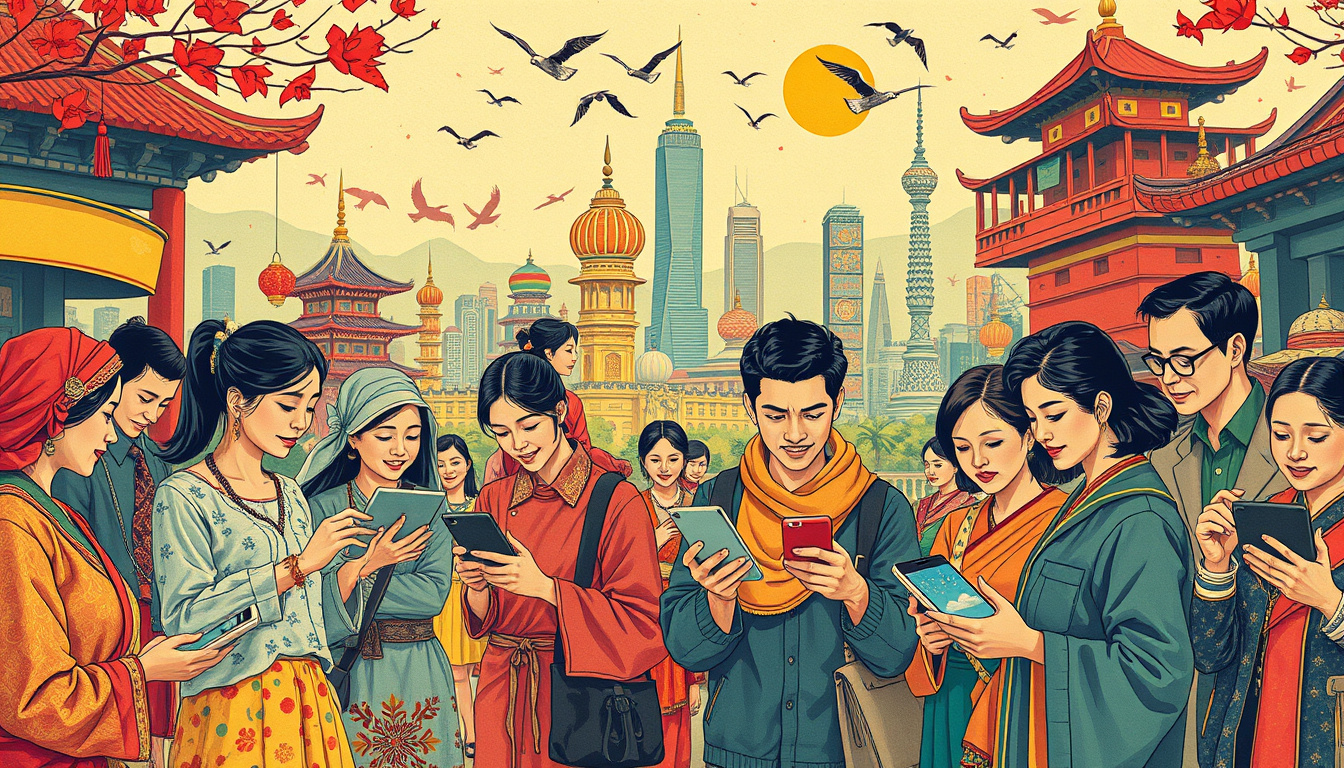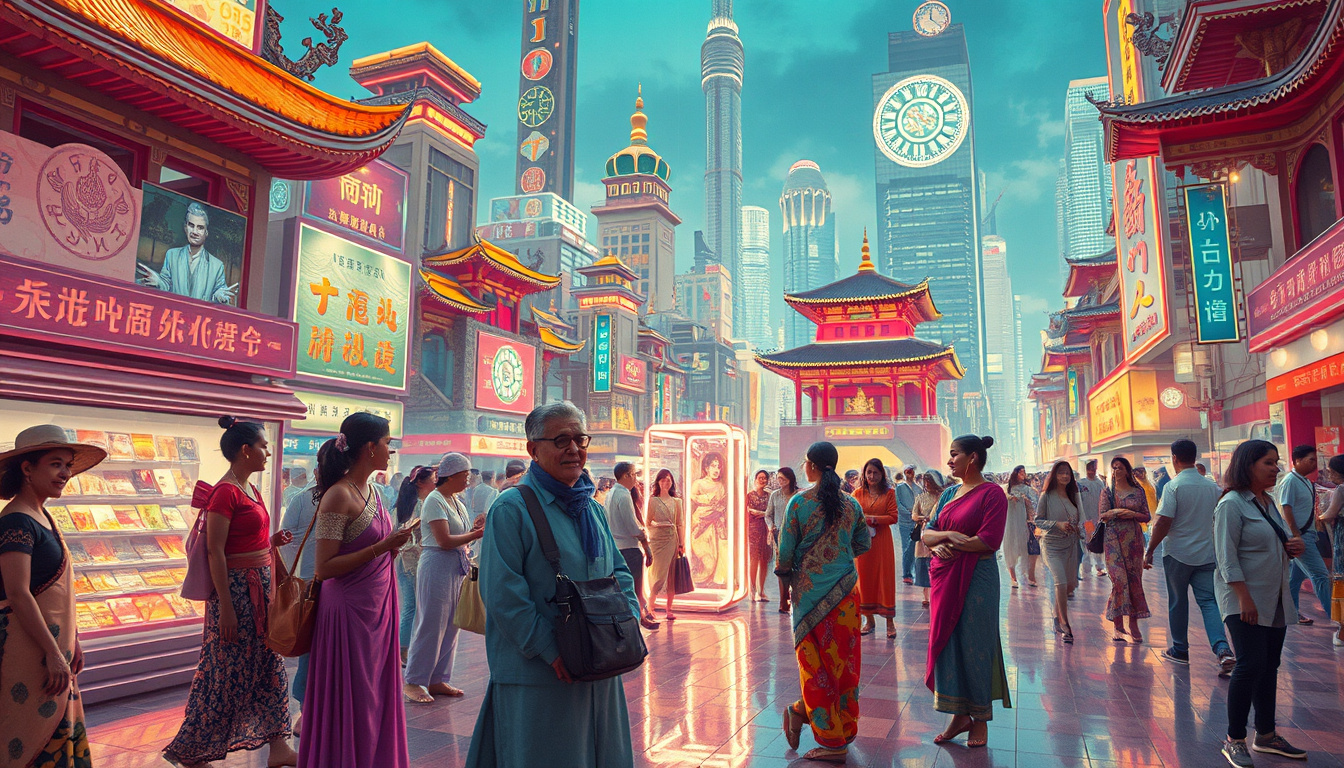Cultural exchanges have been a vital aspect of human interaction throughout history, fostering understanding and cooperation among diverse communities.
As societies have evolved, these exchanges have taken different shapes, enabled by trade, migration, and diplomacy.
In today’s technologically-driven world, cultural exchanges continue to enrich lives, break down barriers, and promote global citizenship.
This article delves into the concept of cultural exchanges, exploring historical examples, the role of technology, their societal impacts, and future trends that promise to further enhance cross-cultural connections.

The Main Points:
- Cultural exchanges have historically facilitated mutual understanding and collaboration between diverse societies.
- Examples throughout history demonstrate how cultural exchanges lead to significant advancements in art, science, and philosophy.
- Modern technology plays a crucial role in accelerating cultural exchanges across the globe, connecting people instantly.
- The impact of cultural exchanges on society can be profound, fostering tolerance and appreciation for different ways of life.
- Future trends suggest that cultural exchanges will continue to evolve, influenced by globalization and digital communication.
Introduction to Cultural Exchanges
Cultural exchanges play a pivotal role in fostering understanding and appreciation among diverse communities around the globe.
These exchanges enable individuals to experience different languages, traditions, and lifestyles, enriching their own perspectives and encouraging a sense of global citizenship.
Through various platforms like educational programs, arts initiatives, and travel, cultural exchanges not only enhance interpersonal relationships but also promote peaceful coexistence and collaboration among nations.
By participating in cultural exchanges, individuals can transcend their own cultural boundaries, leading to valuable insights and lifelong connections that shape a more inclusive world.
Historical Examples of Cultural Exchanges
Cultural exchanges have played a pivotal role in shaping societies throughout history, with myriad examples illustrating their profound impact.
One notable instance is the Silk Road, which facilitated not only the trade of goods but also the sharing of ideas, technologies, and religions between East and West.
Along this ancient trade route, merchants, travelers, and scholars interacted, leading to significant cultural exchanges that influenced art, science, and philosophy across continents.
Similarly, during the Age of Exploration in the 15th and 16th centuries, European explorers encountered indigenous cultures in the Americas, leading to a blending of traditions and ideas, albeit often accompanied by conflict and colonialism.
The Renaissance also exemplifies a significant period of cultural exchange, as ideas from the Islamic Golden Age, brought back to Europe, spurred advancements in science, mathematics, and the arts.
These historical examples of cultural exchanges illustrate not only the transfer of knowledge and technology but also the enduring relationships that shape human civilization.
‘Cultural exchange is not just a matter of art but a matter of humanity; it is our way to communicate who we are and how we understand the world.’ – Anonymous

The Role of Technology in Cultural Exchanges
Cultural exchanges have become increasingly vibrant and accessible due to the advancements in technology.
The internet, social media, and digital communication have catalyzed the sharing of ideas, customs, and practices across borders, allowing people from various backgrounds to connect in unprecedented ways.
For instance, virtual platforms enable artists, educators, and influencers to collaborate and share their cultural heritage with global audiences, enriching the understanding of diverse traditions.
Additionally, technology facilitates language learning through online courses and apps, promoting direct communication and fostering deeper cultural appreciation.
This integration of digital tools not only enhances the reach of cultural exchanges but also creates new avenues for dialogue and understanding, bridging gaps between different societies.
Impact of Cultural Exchanges on Society
Cultural exchanges play a pivotal role in shaping societies by fostering understanding, tolerance, and collaboration among diverse communities.
When individuals from different backgrounds share their traditions, languages, and customs, they create a richer tapestry of cultural identity.
This interaction not only nurtures mutual respect but also opens up avenues for innovative ideas and practices.
For instance, through cultural exchanges, societies can adopt progressive trends in art, cuisine, and technology, enhancing their overall quality of life.
Moreover, these exchanges can stimulate economic development and tourism, as people become more curious about the cultural heritage of other regions.
Overall, the impact of cultural exchanges is profound, as they bridge societal divides and promote global citizenship in an increasingly interconnected world.

Future Trends in Cultural Exchanges
As global connectivity continues to expand, the landscape of cultural exchanges is evolving at a remarkable pace.
Future trends in cultural exchanges will likely be driven by advances in technology, fostering deeper engagement and understanding among diverse cultures.
Virtual reality and augmented reality tools are set to redefine how individuals experience traditions, art, and rituals from around the world.
Furthermore, social media platforms will play a crucial role in promoting cross-cultural interactions, allowing users to share personal experiences and learn from one another.
The rise of immersive experiences and global collaborations in education, arts, and travel will not only enhance cross-cultural communication but also encourage empathy and appreciation for cultural diversity.
As we look ahead, it is clear that cultural exchanges will become more accessible, inclusive, and integral to building a more interconnected world.
Good To Know:
What are cultural exchanges?
Cultural exchanges refer to the sharing of ideas, values, traditions, and practices between different cultures, often facilitated through various means such as travel, communication, and events.
Can you provide some historical examples of cultural exchanges?
Sure!
Historical examples of cultural exchanges include the Silk Road trade routes that facilitated the exchange of goods and cultural practices between East and West, and the Columbian Exchange which led to the exchange of crops, animals, and ideas between the Americas and the Old World.
How has technology influenced cultural exchanges?
Technology has significantly accelerated cultural exchanges by enabling instant communication and access to diverse cultural content through the internet, social media, and digital platforms, allowing people to share and experience cultures from around the world easily.
What impact do cultural exchanges have on society?
Cultural exchanges can foster understanding and tolerance among different groups, enhance creativity and innovation, and contribute to the preservation of cultural heritage, while also posing challenges such as cultural appropriation or loss of cultural identity.
What are some future trends in cultural exchanges?
Future trends in cultural exchanges may include increased virtual exchanges through digital platforms, a focus on sustainability in cultural sharing, and efforts to promote inclusivity and representation of underrepresented cultures on global stages.
————————————————————————
Follow the Bimoseto family as we explore the world, one delicious dish at a time! Get our travel tips, restaurant recommendations, and adventure stories – and get inspired for your journeys!
